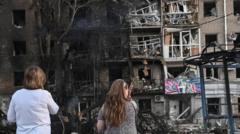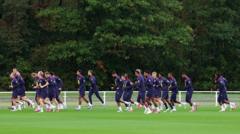Why Does Putin Maintain His Hardline Stance on the Ukraine War?

Published: 2025-09-06 03:07:15 | Category: technology
This article examines the escalating tensions between Russia and the West amid the ongoing war in Ukraine, especially in light of recent comments made by President Vladimir Putin. His warnings against Western military involvement reveal the Kremlin's firm stance on peace negotiations, which it insists must be on its terms. The contrasting perspectives of Russia and Ukraine highlight the complexities of achieving lasting peace.
Last updated: 01 October 2023 (BST)
Key Takeaways
- Putin's recent statements signal Russia's strong opposition to any Western military presence in Ukraine.
- The Kremlin is emboldened by perceived military and diplomatic successes.
- Differences in peace perspectives show a significant divide between Russia and Ukraine.
- Putin's proposed peace talks are viewed sceptically by international observers.
- The ongoing conflict continues to shape global geopolitical dynamics.
Putin's Warning to the West
During a recent economic forum in Vladivostok, President Vladimir Putin issued a stark warning to the West regarding any potential military involvement in Ukraine. He stated, "If some troops appear there, especially now while the fighting's going on, we proceed from the premise that these will be legitimate targets for destruction." This assertive declaration was met with applause from the audience, including Russian officials and business leaders, highlighting a chilling acceptance of aggressive rhetoric within Russia.
The Context of the Warning
Putin's comments come amidst a backdrop of renewed commitments from Ukraine's allies, collectively referred to as the Coalition of the Willing, who have pledged to establish a post-war "reassurance force" for Ukraine. The juxtaposition of these international commitments with Putin's threats underlines the escalating tension surrounding the conflict.
Applause for Provocation
The reaction from the audience—applause for the notion of targeting Western troops—suggests a strong nationalist sentiment within Russia, where aggressive posturing against perceived adversaries is welcomed. This reaction also serves to reinforce the Kremlin's narrative of being under threat from Western nations.
Putin's Offer for Peace Talks
Further complicating the situation, Putin expressed a willingness to meet with Ukrainian President Volodymyr Zelensky, but on the condition that the talks take place in Moscow, which many observers have dismissed as a political stunt. The notion of negotiating peace on Russian soil, particularly in the context of ongoing military operations, raises questions about the sincerity of such offers.
The Implications of Russia's Stance
Putin's uncompromising stance indicates a broader strategy: "Yes, we want peace, but only on our terms." This reflects a belief in Russia's military initiative and a calculated diplomatic posture, bolstered by recent engagements with leaders from China, India, and North Korea. Such optics are designed to project strength and allyship, countering narratives of isolation.
Diplomatic Maneuvering and Perceived Confidence
Recent diplomatic engagements have contributed to a growing confidence within the Kremlin. For instance, Putin's handshakes with global leaders in China were intended to showcase Russia's influential partnerships. Meanwhile, the lack of follow-through on US President Donald Trump's threats of sanctions has further emboldened Russia. Pro-Kremlin commentators view Trump's overtures as signs of failing Western isolation efforts.
Challenges to Peace Negotiations
Despite overtures for peace, the Kremlin has shown little inclination to make concessions or adhere to ceasefire proposals. Trump's previous ultimatums have not resulted in tangible outcomes, and the ongoing conflict continues to complicate any potential resolution. Each side appears entrenched in its positions, with Russia seeking to solidify gains through military means, while Ukraine and its allies prioritize security guarantees and military readiness for the future.
Different Visions for the Future
Putin's assertion that he sees "light at the end of the tunnel" serves as a metaphor for his vision of a victorious Russia. In this context, the "light" suggests a future where Russia emerges as a dominant power in a redefined global order. Conversely, Ukraine and Europe are focused on achieving a sustainable peace that prevents further aggression by ensuring a robust Ukrainian military presence.
The Diverging Paths to Peace
The stark contrast in these visions underscores the complexities of reaching a consensus. While Ukraine and its allies are striving to end hostilities and secure their sovereignty, Russia's interpretation of "peace" is intertwined with territorial ambitions and geopolitical advantages. This divergence complicates the potential for negotiations and highlights the significant distance between the two sides.
The Road Ahead
As the conflict continues, the prospect of peace remains uncertain. The interplay of military, political, and diplomatic factors will be crucial in shaping the future of Ukraine and its relationships with Western allies. The differing objectives between Russia and Ukraine suggest that finding common ground will be challenging.
What Lies Ahead for Ukraine and Russia?
Ultimately, the ongoing war in Ukraine illustrates a profound clash of interests and ideologies. With both sides entrenched in their positions, the path to peace may remain elusive. It is essential to monitor the evolving geopolitical landscape to understand the implications for regional and global security.
As we reflect on these developments, one must consider: how will the international community respond to these escalating tensions, and what strategies will be employed to bridge the gap between such opposing views? #UkraineConflict #Putin #Geopolitics
FAQs
What did Putin say about Western troops in Ukraine?
Putin warned that any Western troops sent to Ukraine would be considered legitimate targets for destruction, indicating Russia's firm stance against foreign military involvement.
What was the audience's reaction to Putin's warning?
The audience at the Vladivostok forum applauded Putin's threat against Western troops, reflecting support for his aggressive rhetoric.
What conditions did Putin set for peace talks with Ukraine?
Putin proposed that he would be open to meeting with President Zelensky, but only if the talks took place in Moscow, which has been viewed as a non-serious offer by many observers.
How does the current conflict affect international relations?
The ongoing war in Ukraine has strained relations between Russia and the West, with geopolitical implications that extend beyond the region, affecting alliances and diplomatic strategies globally.
What are the prospects for peace in Ukraine?
The prospects for peace remain uncertain, with significant differences in the objectives of Russia and Ukraine, complicating any potential negotiations.



